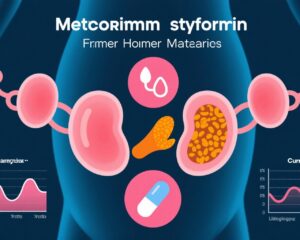Highlight
– Metformin at 1,700 mg daily significantly reduces the incidence of type 2 diabetes in people with metabolic syndrome.
– The addition of a Mediterranean diet intervention does not confer significant further reduction beyond metformin alone.
– Metformin with or without Mediterranean diet results in lower cumulative incidence of major noncommunicable diseases including diabetes, cardiovascular disease, and cancer compared with placebo.
Study Background and Disease Burden
Metabolic syndrome represents a cluster of risk factors—such as abdominal obesity, insulin resistance, hypertension, and dyslipidemia—that increase the propensity to develop multiple age-related diseases, most notably type 2 diabetes mellitus (T2DM), cardiovascular diseases (CVD), and certain cancers. Globally, the prevalence of metabolic syndrome continues to rise, posing a significant public health burden. Despite well-established dietary recommendations, adherence remains suboptimal, and pharmacologic prevention strategies have been explored.
Metformin, a first-line antidiabetic agent, has demonstrated pleiotropic effects including improvement of insulin sensitivity and possible anti-aging properties. Dietary measures, especially the Mediterranean diet characterized by high intake of fruits, vegetables, whole grains, legumes, and olive oil, have been associated with decreased vascular risk and longevity. However, the combined effect of metformin therapy with or without Mediterranean diet modification for preventing major noncommunicable diseases in metabolic syndrome patients had not been definitively evaluated in a large randomized controlled trial prior to the MeMeMe study.
Study Design
The MeMeMe trial was a prospective, randomized, factorial-design clinical trial involving 1,442 participants diagnosed with metabolic syndrome. Participants were randomly assigned into one of four treatment arms:
1. Metformin 1,700 mg/day plus Mediterranean diet intervention (MET+MedDiet)
2. Placebo plus Mediterranean diet intervention
3. Metformin 1,700 mg/day alone
4. Placebo alone
The Mediterranean diet intervention included nutritional counseling and education tailored to enhance adherence.
Participants were followed for a mean duration of approximately three years. The primary endpoint was the cumulative incidence of major noncommunicable diseases (NCDs), specifically incident cases of T2DM, cardiovascular diseases, and cancers. Secondary endpoints included the incidence of T2DM and the dynamic changes in metabolic syndrome prevalence.
Key Findings
Over the median follow-up period, the crude incidence rates of major NCDs were:
– 6.7 cases per 100 person-years in the MET+MedDiet group
– 6.9 cases per 100 person-years in the MET-alone group
– 13.3 cases per 100 person-years in the placebo plus MedDiet group
– 11.3 cases per 100 person-years in the placebo-alone group
The beneficial impact observed was largely attributable to the prevention of type 2 diabetes. Compared with placebo, the incidence of diabetes was reduced by 80% in the metformin-alone group and by 92% in those receiving both metformin and Mediterranean diet intervention. Notably, the Mediterranean diet without metformin did not achieve significant diabetes prevention compared to placebo.
Regarding cardiovascular disease and cancer incidence, there were no statistically significant differences between the intervention arms within the follow-up period, suggesting the protective effect was predominantly on diabetes onset.
Secondary analyses demonstrated some improvement in the prevalence of metabolic syndrome components with metformin treatment. Safety and tolerability of metformin at the prescribed dose were consistent with its known profile, with no new adverse safety signals reported.
Expert Commentary
The MeMeMe trial provides robust evidence supporting the use of metformin for diabetes prevention in patients with metabolic syndrome. The magnitude of diabetes risk reduction aligns with prior prevention trials emphasizing metformin’s potential beyond glycemic control, hinting at disease-modifying effects.
The lack of additional benefit from Mediterranean diet alone, and no synergistic effect when combined with metformin, is noteworthy. While dietary patterns confer multiple health benefits, this study underscores that pharmacologic intervention with metformin may be more efficacious for diabetes prevention in this high-risk population over a three-year timeframe.
Limitations include the relatively short follow-up period for cardiovascular and cancer outcomes, and potential variations in diet adherence despite counseling. Future research with longer observation and mechanistic studies may clarify if metformin’s prevention extends to other age-related diseases beyond diabetes.
Conclusion
The MeMeMe randomized trial demonstrated that metformin 1,700 mg daily effectively prevents type 2 diabetes in individuals with metabolic syndrome, with or without a Mediterranean diet intervention. While the Mediterranean diet remains important for overall health, metformin’s role as a preventive pharmacological agent for age-related diseases related to metabolic syndrome is emphasized. Clinicians should consider metformin therapy in metabolic syndrome patients at high diabetes risk alongside recommendations for healthy diet and lifestyle modifications. Further investigations are warranted to explore metformin’s impact on cardiovascular and cancer outcomes with extended follow-up.
References
Pasanisi P, Oliverio A, Baldassari I, Bruno E, Venturelli E, Bellegotti M, Gargano G, Morelli D, Bognanni A, Rigoni M, Muti P, Berrino F. Metformin Treatment With or Without Mediterranean Diet for the Prevention of Age-Related Diseases in People With Metabolic Syndrome: The MeMeMe Randomized Trial. Diabetes Care. 2025 Feb 1;48(2):265-272. doi: 10.2337/dc24-1597. PMID: 39641916; PMCID: PMC11770154.



